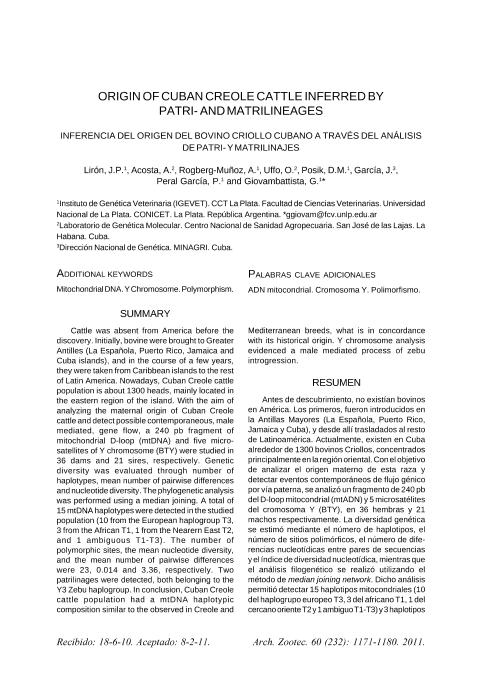Artículo
Antes de descubrimiento, no existían bovinos en América. Los primeros, fueron introducidos en la Antillas Mayores (La Española, Puerto Rico, Jamaica y Cuba), y desde allí trasladados al resto de Latinoamérica. Actualmente, existen en Cuba alrededor de 1300 bovinos Criollos, concentrados principalmente en la región oriental. Con el objetivo de analizar el origen materno de esta raza y detectar eventos contemporáneos de flujo génico por vía paterna, se analizó un fragmento de 240 pb del D-loop mitocondrial (mtADN) y 5 microsatélites del cromosoma Y (BTY), en 36 hembras y 21 machos respectivamente. La diversidad genética se estimó mediante el número de haplotipos, el número de sitios polimórficos, el número de diferencias nucleotídicas entre pares de secuencias y el índice de diversidad nucleotídica, mientras que el análisis filogenético se realizó utilizando el método de median joining network. Dicho análisis permitió detectar 15 haplotipos mitocondriales (10 del haplogrupo europeo T3, 3 del africano T1, 1 del cercano oriente T2 y 1 ambiguo T1-T3) y 3 haplotipos en el BTY, ambos del haplogrupo cebuíno Y3. En el mtADN se detectaron 23 sitios polimórficos con una diversidad nucleotídica de 0,014 y 3,36 diferencias medias entre pares de secuencias. En conclusión, la población de bovinos Criollos Cubanos presentó una composición haplotípica mitocondrial comparable a la de otras razas criollas y mediterráneas, hecho que concuerda con su origen histórico. El BTY evidenció altos niveles de introgresion paterna de genes del zebú. Cattle was absent from America before the discovery. Initially, bovine were brought to Greater Antilles (La Española, Puerto Rico, Jamaica and Cuba islands), and in the course of a few years, they were taken from Caribbean islands to the rest of Latin America. Nowadays, Cuban Creole cattle population is about 1300 heads, mainly located in the eastern region of the island. With the aim of analyzing the maternal origin of Cuban Creole cattle and detect possible contemporaneous, male mediated, gene flow, a 240 pb fragment of mitochondrial D-loop (mtDNA) and five microsatellites of Y chromosome (BTY) were studied in 36 dams and 21 sires, respectively. Genetic diversity was evaluated through number of haplotypes, mean number of pairwise differences and nucleotide diversity. The phylogenetic analysis was performed using a median joining. A total of 15 mtDNA haplotypes were detected in the studied population (10 from the European haplogroup T3, 3 from the African T1, 1 from the Nearern East T2, and 1 ambiguous T1-T3). The number of polymorphic sites, the mean nucleotide diversity, and the mean number of pairwise differences were 23, 0.014 and 3.36, respectively. Two patrilinages were detected, both belonging to the Y3 Zebu haplogroup. In conclusion, Cuban Creole cattle population had a mtDNA haplotypic composition similar to the observed in Creole and Mediterranean breeds, what is in concordance with its historical origin. Y chromosome analysis evidenced a male mediated process of zebu introgression.
Origin of Cuban Creole cattle inferred by patri- and matrilineages
Título:
Inferencia del origen del bovino Criollo Cubano a través del análisis de patri- y matrilinajes
Liron, Juan Pedro ; Acosta, A.; Rogberg Muñoz, Andres
; Acosta, A.; Rogberg Muñoz, Andres ; Uffo, O.; Posik, Diego Manuel
; Uffo, O.; Posik, Diego Manuel ; Garcia, J.; Peral Garcia, Pilar
; Garcia, J.; Peral Garcia, Pilar ; Giovambattista, Guillermo
; Giovambattista, Guillermo
 ; Acosta, A.; Rogberg Muñoz, Andres
; Acosta, A.; Rogberg Muñoz, Andres ; Uffo, O.; Posik, Diego Manuel
; Uffo, O.; Posik, Diego Manuel ; Garcia, J.; Peral Garcia, Pilar
; Garcia, J.; Peral Garcia, Pilar ; Giovambattista, Guillermo
; Giovambattista, Guillermo
Fecha de publicación:
12/2011
Editorial:
Universidad de Córdoba
Revista:
Archivos de Zootecnia
ISSN:
0004-0592
e-ISSN:
1885-4494
Idioma:
Inglés
Tipo de recurso:
Artículo publicado
Clasificación temática:
Resumen
Palabras clave:
Adn Mitocrondrial
,
Cromosoma
,
Polimorfismo
Archivos asociados
Licencia
Identificadores
Colecciones
Articulos(IGEVET)
Articulos de INST.DE GENETICA VET ING FERNANDO NOEL DULOUT
Articulos de INST.DE GENETICA VET ING FERNANDO NOEL DULOUT
Citación
Liron, Juan Pedro; Acosta, A.; Rogberg Muñoz, Andres; Uffo, O.; Posik, Diego Manuel; et al.; Origin of Cuban Creole cattle inferred by patri- and matrilineages; Universidad de Córdoba; Archivos de Zootecnia; 60; 232; 12-2011; 1171-1180
Compartir
Altmétricas



